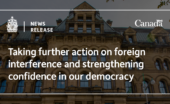Re Ian Bremmer 'Could third-party candidates upend the 2024 US election?' 3 April The current political movement in the USA…
China threatens 'nuclear option' of dollar sales
Written by Diana Thebaud Nicholson // August 7, 2007 // China, Economy, U.S. // 4 Comments
8 August 2007
By Ambrose Evans-Pritchard
Telegraph U.K.
The Chinese government has begun a concerted campaign of economic threats against the United States, hinting that it may liquidate its vast holding of US treasuries if Washington imposes trade sanctions to force a yuan revaluation.
Two officials at leading Communist Party bodies have given interviews in recent days warning – for the first time – that Beijing may use its $1.33 trillion (£658bn) of foreign reserves as a political weapon to counter pressure from the US Congress. Shifts in Chinese policy are often announced through key think tanks and academies.
Described as China’s “nuclear option” in the state media, such action could trigger a dollar crash at a time when the US currency is already breaking down through historic support levels.
… A bill drafted by a group of US senators, and backed by the Senate Finance Committee, calls for trade tariffs against Chinese goods as retaliation for alleged currency manipulation.
The yuan has appreciated 9pc against the dollar over the last two years under a crawling peg but it has failed to halt the rise of China’s trade surplus, which reached $26.9bn in June.
Henry Paulson, the US Tresury Secretary, said any such sanctions would undermine American authority and “could trigger a global cycle of protectionist legislation”.
Mr Paulson is a China expert from his days as head of Goldman Sachs. He has opted for a softer form of diplomacy, but appeared to win few concession from Beijing on a unscheduled trip to China last week aimed at calming the waters. Full text of article




4 Comments on "China threatens 'nuclear option' of dollar sales"
The collapse of the dollar implies a , presumably serious, revaluation of the yuan against the dollar.If Chinese exports to the US (and to the dollar based part of the world) are price sensitive, Chinese exports fall, Chinese unemployment rises.That is the last thing the Chinese government wants/needs.
Antal Deutsch OWN
Very interesting timing. One suspects that an impartial observer might have
already concluded that now was the time to short the US$ and buy Yuan. The
story seems to overlook the fact that this strategy would have exactly the
effect the Fed needs to restrain inflation but for which it seems to lack political support. Blaming China would certainly offer a useful way out–and leave China with a revalued Yuan that would represent a public good for the global financial system.
Therefore the question suggests itself: is it a threat or a promise? Guy Stanley OWN
I agree with Tony. This conspiracy theory makes no sense from the Chinese perspective. The US is China’s most important customer and exports are the job engine. If you use the nuclear option you’d kill the very US consumer the Chinese exporter is trying to sell to. Peter Perkins OWN
In my manuscript, I call this the mutually assured economic destruction theory. But the fact is that China has lots and lots of other markets and the U.S. is hooked on cheap Chinese goods. The goods might become comparatively a bit more expensive, but where else is the US going to get them from that’s cheaper, especially in the short term? Also, a stronger yuan versus dollar might help in quick Chinese buy-ups of U.S. companies (especially in the coveted commodities sector). None of this is ideal, but from a Chinese point-of-view, it’s not necessarily catastrophic. Though I suspect it’s the economic equivalent of the old Art of War thing about if you are going to start a war, make sure you have clear over-whelming force so the other side gives in before it starts. BTW, this is also yet another reason to resist the push towards a combined US/Canada currency. Cleo Paskal